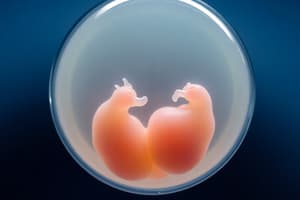Podcast
Questions and Answers
What is the main influence of yolk on cleavage?
What is the main influence of yolk on cleavage?
- It affects only the rate of cleavage.
- It impacts both the rate and pattern of cleavage. (correct)
- It solely determines the number of cells formed.
- It determines the size of blastomeres only.
What characterizes determinate cleavage?
What characterizes determinate cleavage?
- All blastomeres can become a complete organism.
- Only some cells have the capacity to divide.
- The developmental fate of cells is predetermined early. (correct)
- Each cleavage division results in equal-sized cells.
Which plane of cleavage runs through the animal-vegetal axis and bisects the egg?
Which plane of cleavage runs through the animal-vegetal axis and bisects the egg?
- Latitudinal plane
- Vertical plane
- Equatorial plane
- Meridional plane (correct)
In which type of cleavage do only a portion of the egg's cells divide?
In which type of cleavage do only a portion of the egg's cells divide?
What occurs during equal holoblastic cleavage?
What occurs during equal holoblastic cleavage?
Which type of cleavage typically occurs in reptiles and birds?
Which type of cleavage typically occurs in reptiles and birds?
What is a characteristic of indeterminate cleavage?
What is a characteristic of indeterminate cleavage?
Which cleavage pattern produces macromeres and micromeres due to yolk concentration?
Which cleavage pattern produces macromeres and micromeres due to yolk concentration?
What is the main role of yolk in animal eggs?
What is the main role of yolk in animal eggs?
Which type of egg has no yolk particles?
Which type of egg has no yolk particles?
In which type of egg are yolk particles concentrated at one end of the egg?
In which type of egg are yolk particles concentrated at one end of the egg?
What occurs immediately after fertilization of an egg?
What occurs immediately after fertilization of an egg?
What refers to the initial mitotic divisions of the fertilized egg?
What refers to the initial mitotic divisions of the fertilized egg?
Which axis of the egg has the highest concentration of yolk?
Which axis of the egg has the highest concentration of yolk?
How are the cells produced from cleavage referred to?
How are the cells produced from cleavage referred to?
What does the cleavage furrow signify in the cleavage process?
What does the cleavage furrow signify in the cleavage process?
Flashcards
Cleavage
Cleavage
The rapid cell divisions of a fertilized egg during early embryonic development.
Holoblastic cleavage
Holoblastic cleavage
A type of cleavage where the entire egg divides completely.
Meroblastic cleavage
Meroblastic cleavage
A type of cleavage where only part of the egg divides.
Determinate cleavage
Determinate cleavage
Signup and view all the flashcards
Indeterminate cleavage
Indeterminate cleavage
Signup and view all the flashcards
Yolk's influence on cleavage
Yolk's influence on cleavage
Signup and view all the flashcards
Meridional plane
Meridional plane
Signup and view all the flashcards
Discoidal meroblastic cleavage
Discoidal meroblastic cleavage
Signup and view all the flashcards
Alecithal eggs
Alecithal eggs
Signup and view all the flashcards
Oligolecithal eggs
Oligolecithal eggs
Signup and view all the flashcards
Mesolecithal eggs
Mesolecithal eggs
Signup and view all the flashcards
Macrolecithal eggs
Macrolecithal eggs
Signup and view all the flashcards
Isolecithal eggs
Isolecithal eggs
Signup and view all the flashcards
Centrolecithal eggs
Centrolecithal eggs
Signup and view all the flashcards
Telolecithal eggs
Telolecithal eggs
Signup and view all the flashcards
Cleavage
Cleavage
Signup and view all the flashcards
Study Notes
Embryology: Types of Eggs
- Animal eggs contain nutrients (protein, lipid, glycogen) to nourish the embryo, collectively called yolk.
- Yolk proteins are produced in the liver (vertebrates) or fat bodies (insects).
- Eggs are classified by yolk presence/absence and quantity:
Classification by Yolk Amount
- Alecithal: No yolk, found in placental mammals.
- Oligolecithal: Small amount of yolk, found in Echinoderms and Amphioxus.
- Mesolecithal: Moderate amount of yolk, found in toads.
- Macrolecithal: Large amount of yolk, found in many species.
Classification by Yolk Distribution
- Isolecithal: Yolk distributed evenly throughout the cytoplasm, found in fishes.
- Centrolecithal: Yolk concentrated in the center of the egg, found in insects and arthropods.
- Telolecithal: Yolk concentrated at one end (pole) of the egg, found in some fishes and toads.
Zygote Formation
- A fertilized egg (zygote) develops into an embryo after the first cleavage (division).
- The zygote forms a diploid multicellular organism via repeated mitotic divisions and cellular differentiation.
Cleavage
- Cleavage is the initial mitotic divisions in a fertilized egg.
- The pole with most yolk is called the vegetal pole, the opposite the animal pole.
- Cleavage initiates by furrows (grooves) that start at a single point on the egg.
- A cleavage furrow forms and deepens, eventually separating the egg into blastomeres.
Yolk Influence on Cleavage
- Yolk affects cleavage rate and pattern.
- Determinate cleavage: The fate of cells is determined early in development; each blastomere may not form a whole embryo.
- Indeterminate cleavage: Each blastomere can develop into a complete organism.
Planes of Cleavage
- Cleavage occurs in specific planes:
- Meridional: Passes through the animal-vegetal axis, bisecting both poles.
- Vertical: Passes from the animal to vegetal pole, not through the egg's center.
- Equatorial: Passes at right angles to the main axis, at the midpoint between animal and vegetal poles.
- Latitudinal/horizontal: Similar to equatorial but courses through the cytoplasm on either side.
Types of Cleavage Patterns
- Holoblastic: Complete divisions of the egg.
- Equal holoblastic: Blastomeres are roughly equal in size.
- Unequal holoblastic: Blastomeres uneven in size due to yolk concentration.
- Meroblastic: Partial divisions, where only part of the egg divides.
- Discoidal meroblastic: A disc-shaped region of the egg (blastodisc) divides, while the yolk remains undivided. Found in reptiles and birds.
- Superficial meroblastic: Nuclei migrate to the periphery, and cleavage occurs only in the peripheral cytoplasm. Found in insects.
Studying That Suits You
Use AI to generate personalized quizzes and flashcards to suit your learning preferences.




